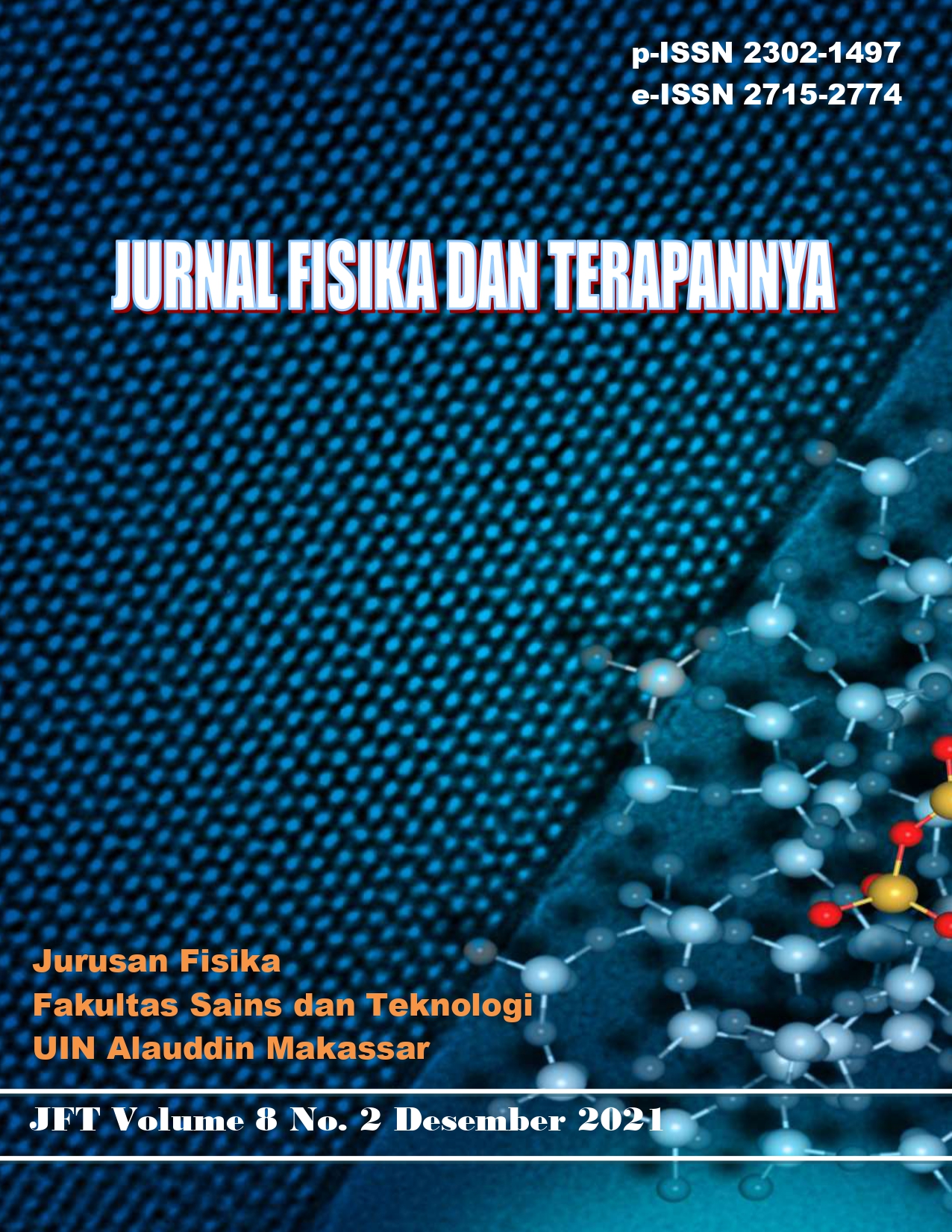ANALISIS POTENSI SUMBER DAYA BATUGAMPING DI KAWASAN KARST DESA SAMANGKI, KABUPATEN MAROS, SULAWESI SELATAN
Abstract
Research has been carried out in Samangki Village which aims to analyze the potential of limestone resources using the Geoelectrical Resistivity Method with the Wenner-Schlumberger configuration. Data were collected at 801904.40-802051.05 NE and 9440758.03-9440548.93 SW for 3 lines along 120 m with 10 m electrode space in a track. Acquired data were processed using Microsoft Excel, Notepad, RES2DINV, ArcGIS, and Google Earth applications to produce resistivity cross-sections and other supporting maps. Based on data interpretation, it shows that the low resistivity zone is an alluvium deposit (Qac) with resistivity value of 17.58 to 170 Ωm; and the high resistivity zone indicates the presence of limestone which is part of the Tonasa Formation (Temt). The presence of limestone on line-1 with resistivity value of 326.00 to 931.90 Ωm at position(x) 60 to 90 m, in depth(y) 1.25 to 9.26 m as shallow area, and at position 40-45 m in depth 16 to 19.8 m as the deepest area. Then the limestone on line-2 is indicated as a subsurface karst tower with a resistivity value of 462.00 to 809.36 Ωm at position 30 to 50 m in depth 1.25 to 19.8 m. Limestone also located on the northeastern edge of line-3 with resistivity values of 431.00 to 739.66 Ωm at a position of 12.5 to 17.5 m in depth of 1.25 to 6.38 m. It proves that Samangki Village has large potential for limestone resources. This research need further geoelectrical study with broad coverage area and geochemical analysis for detail karst characterization
Downloads
References
Abdeltawab, S. (2013). Karst limestone foundation geotechnical problems, detection and treatment: Case studies from Egypt and Saudi Arabia. 4(5), 13.
Adji, T. N., & Haryono, E. (2017). KAWASAN KARST DAN PROSPEK PENGEMBANGANNYA DI INDONESIA [Preprint]. INA-Rxiv. https://doi.org/10.31227/osf.io/ykt3f
Al Hussein Flowers Rizqi, & Oky Sugarbo, (second). (2021). Investigation of Aquifer Zone in Tambakromo Village, Ponjong Subdistrict, Gunung Kidul Regency, Yogyakarta, Indonesia. JIPF (JURNAL ILMU PENDIDIKAN FISIKA), Vol. 6 No. 3, 216–227.
Balazs, D. (1968). KARSZT- ÉS BARLANGKUTATÁS. Hungaria, Budapest.
Fatmainnah, Arsyad, M., & Palloan, P. (2018). Analysis of medium characteristic based on grain size Gua Mimpi Maros Karst Region Bantimurung – Bulusaraung National Park. Journal of Physics: Conference Series, 1120, 012057. https://doi.org/10.1088/1742-6596/1120/1/012057
Haryono, E., & Adji, T. N. (2017). GEOMORFOLOGI DAN HIDROLOGI KARST [Preprint]. INA-Rxiv. https://doi.org/10.31227/osf.io/7jtgx
Hikmah, D. S., & Dewi, I. K. (2021). Identifikasi keberadaan rongga bawah permukaan dengan menggunakan metode geolistrik konfigurasi dipole-dipole daerah Karst Desa Monggol Kabupaten Gunungkidul. 5.
Samangki, Simbang, Maros—Wikipedia bahasa Indonesia, ensiklopedia bebas.html. (n.d.).
Sari, D. F. N. (2018). IDENTIFIKASI KARSTIFIKASI PADA KARAKTERISTIK DOLINA Studi Kasus: Kecamatan Ponjong dan Kecamatan Semanu, Kabupaten Gunung Kidul. Seminar Nasional Geomatika, 2, 115. https://doi.org/10.24895/SNG.2017.2-0.404
Sari, R. P. (2020). ANALISIS MINERAL PEMBENTUK FACIES GUA SALUKANG KALLANG KAWASAN KARST TAMAN NASIONAL BANTIMURUNG BULUSARAUNG MAROS. Jurnal Sains dan Pendidikan Fisika, 15(3). https://doi.org/10.35580/jspf.v15i3.13501
Sehah, M., & Ratsanjani, H. (2021). Eksplorasi sumber air tanah bawah perbukitan kapur (karst) menggunakan metode geolistrik resistivitas konfigurasi Schlumberger di desa Darmakradenan kecamatan Ajibarang kabupaten Banyumas. Jurnal Teras Fisika, 4(1), 194. https://doi.org/10.20884/1.jtf.2021.4.1.3863
Supandi, S. (2021). Geotechnical profiling of a surface mine waste dump using 2D Wenner–Schlumberger configuration. Open Geosciences, 13(1), 335–344. https://doi.org/10.1515/geo-2020-0234
Zainuddin, Z. (2018). PENDUGAAN POLA ALIRAN SUNGAI BAWAH TANAH PADA KAWASAN KARST MAROS DENGAN METODE GEOLISTRIK KONFIGURASI WENNER-SCHLUMBERGER. UIN Alauddin Makassar.
Zhu, J., Currens, J. C., & Dinger, J. S. (2011). Challenges of using electrical resistivity method to locate karst conduits—A field case in the Inner Bluegrass Region, Kentucky. Journal of Applied Geophysics, 75(3), 523–530. https://doi.org/10.1016/j.jappgeo.2011.08.009


